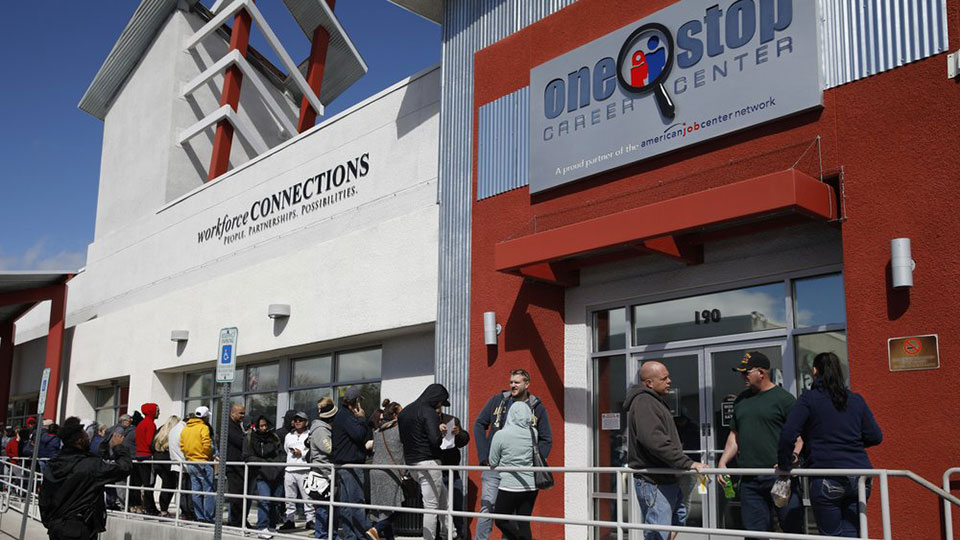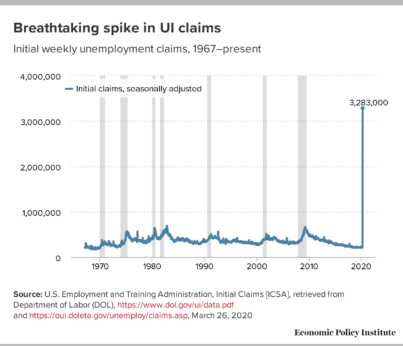
WASHINGTON—Due to coronavirus pandemic shutdowns, weekly jobless claims skyrocketed in the week ending March 21 to 3.283 million, shattering all records since the Bureau of Labor Statistics started collecting such data.
The enormous rise also left the 48 Republican senators who voted against extended unemployment benefits with political egg on their faces, or worse – sheer heartlessness — as the GOP-run Senate approved its $2.2 trillion economic stimulus bill to try to counteract the economic impact of the coronavirus-caused shutdowns.
The bill itself won 96-0. The GOP ban on more jobless aid lost on a 48-48 tie.
“During the week ending March 21, the increase in initial claims is due to the impacts of the COVID-19 virus,” the Bureau of Labor Statistics reported, using the virus’s official name.
“Nearly every state providing comments cited the COVID-19 virus impacts. States continued to cite services industries broadly, particularly accommodation and food services. Additional industries heavily cited for the increases included the health care and social assistance, arts, entertainment and recreation, transportation and warehousing, and manufacturing industries.”
What was even starker was the hike from the week before, BLS said. Unadjusted data – the 3.283 million was adjusted statistically – showed “2,898,450 initial claims in the week ending March 21, an increase of 2,647,034, or 1,052.9% from the previous week…There were 190,023 initial claims in the comparable week in 2019.”

Claims really skyrocketed in Pennsylvania (378,908, up from around 15,000 the week before), Ohio (187,784, up from 7,046 the week before) and New Jersey (155,454, up from 9,467 the week before). California, Illinois, Massachusetts, Michigan, Minnesota, Texas, and Washington state also reported weekly increases of at least 110,000 in new jobless claims. Except for California (57,000), none of those states had more than 16,000 claims the week before. California’s claims rose to 186,809.
And jobless claims in Utah, which depends heavily on tourism, hotels, restaurants and related industries, went from a nationwide low of nine in the week of March 14 to 1,314 in the week ending March 21.
That didn’t stop the Republicans from trying to cut the jobless benefits out of the bill. One of the milder objections came from right-wing Sen. Ted Cruz, R-Texas, back in the Senate after days of self-quarantine to make sure he hadn’t caught the virus.
“States should endeavor to implement this” – the larger and longer jobless benefits – “in a way that ensures people don’t get paid more not to work than to work,” said Cruz.
Sen. Tim Scott, R-S.C., sang the same song, a variation on an old Republican, business and right-wing canard about the unemployed – that they can make more on the government dole. The difference was that in past years, the right alleged, without proof, that the jobless preferred it that way.
“What this bill does, without fixing it, is simply say: You can earn more money by being on unemployment than you can while working. That isn’t an incentive. That is perverse,” Scott said.
The Democrats responded, repeatedly, that more jobless benefits help workers who lost employment through no fault of their own due to the coronavirus-caused economic shutdown.
Outside analysts had mixed opinions about the $2.2 trillion measure and the jobless benefits expansion and extension. “There is much to like in this package, and timely relief is critical. But it also contains many flaws, largely left over from the first proposal forwarded by Senate Republicans,” the Economic Policy Institute said.
“Because many of the weaknesses of this first proposal remain, the package will not be up to the job of fully protecting U.S. workers and their families from the economic consequences of the coronavirus shock, and it will not allow the economy to reboot quickly enough once the public health crisis ends. Further help from policymakers will clearly be needed.”
A relief bill should be “well-targeted and would reliably deliver the vast majority of benefits to workers and their families” and the GOP-crafted measure called the Cares Act “does not do that” due to “design failures.”
That means it won’t be enough to dig the economy out of the coronavirus recession – a point that even some GOP senators conceded during the debate. One Democrat predicted Congress will have to OK another aid package within three months.
Lorah Steichen of the Institute for Policy Studies was even more critical of misplaced priorities – and missed opportunities for change – in the Republican-crafted measure.
“After decades of chronic disinvestment in domestic programs that would help build resilience to the kinds of economic shocks we’re experiencing with the coronavirus crisis today, it’s time that we stop funneling hundreds of billions of dollars each year into the war machine and start investing in real security for our communities,” she said.
“We need a stimulus that puts people over profit,” Steichen declared.
BLS also asked states with increases of at least 1,000 jobless claims to send in comments. Among them, California cited service industry layoffs. Utah didn’t comment. And Illinois reported “layoffs in the construction, accommodation and food services, and administrative, support, waste management, and remediation services industries.”
The federal agency also seeks comments from states with decreases of at least 1,000 jobless claims in a particular week. No state could answer and that line was left blank.












Comments